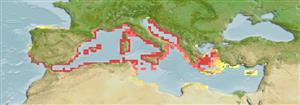>
Blenniiformes (Blennies) >
Blenniidae (Combtooth blennies) > Salariinae
Etymology: canevae: Named for Bernard Heuvelmans (a famous zoologist 'father' of cryptozoology) (Ref. 106103).
Environment: milieu / climate zone / depth range / distribution range
Ecologia
marinhas demersal; intervalo de profundidade 0 - 2 m (Ref. 5981). Subtropical; 46°N - 33°N, 15°W - 36°E
Northeast Atlantic: off southern Portugal and in the Mediterranean Sea.
Tamanho / Peso / Idade
Maturity: Lm ? range ? - ? cm
Max length : 7.5 cm TL macho/indeterminado; (Ref. 5981)
Espinhos dorsais (total) : 8; Raios dorsais moles (total) : 15; Espinhos anais: 2; Raios anais moles: 16.
Facultative air-breathing in the genus (Ref. 126274); Adults prefer steep rocky walls. They feed on small invertebrates especially crustaceans; also feed predominantly on algae (Ref. 5981). Oviparous. Eggs are demersal and adhesive (Ref. 205), and are attached to the substrate via a filamentous, adhesive pad or pedestal (Ref. 94114). Larvae are planktonic, often found in shallow, coastal waters (Ref. 94114).
Life cycle and mating behavior
Maturities | Reprodução | Spawnings | Egg(s) | Fecundities | Larvas
Oviparous, distinct pairing (Ref. 205). Males guard the eggs in the hole spawned by several females (Ref. 5981).
Zander, C.D., 1986. Blenniidae. p. 1096-1112. In P.J.P. Whitehead, M.-L. Bauchot, J.-C. Hureau, J. Nielsen and E. Tortonese (eds.) Fishes of the North-eastern Atlantic and the Mediterranean, volume 3. UNESCO, Paris. (Ref. 5981)
Categoria na Lista Vermelha da IUCN (Ref. 130435)
Ameaça para o homem
Harmless
Utilização humana
Ferramentas
Relatórios especiais
Descarregue XML
Fontes da internet
Estimates based on models
Preferred temperature (Ref.
123201): 17.5 - 20.1, mean 18.9 °C (based on 334 cells).
Phylogenetic diversity index (Ref.
82804): PD
50 = 0.5078 [Uniqueness, from 0.5 = low to 2.0 = high].
Bayesian length-weight: a=0.00741 (0.00335 - 0.01640), b=3.02 (2.83 - 3.21), in cm total length, based on LWR estimates for this (Sub)family-body shape (Ref.
93245).
Nível Trófico (Ref.
69278): 2.1 ±0.0 se; based on diet studies.
Resiliência (Ref.
120179): Elevada, tempo mínimo de duplicação da população menor que 15 meses (Preliminary K or Fecundity.).
Fishing Vulnerability (Ref.
59153): Low vulnerability (10 of 100).
